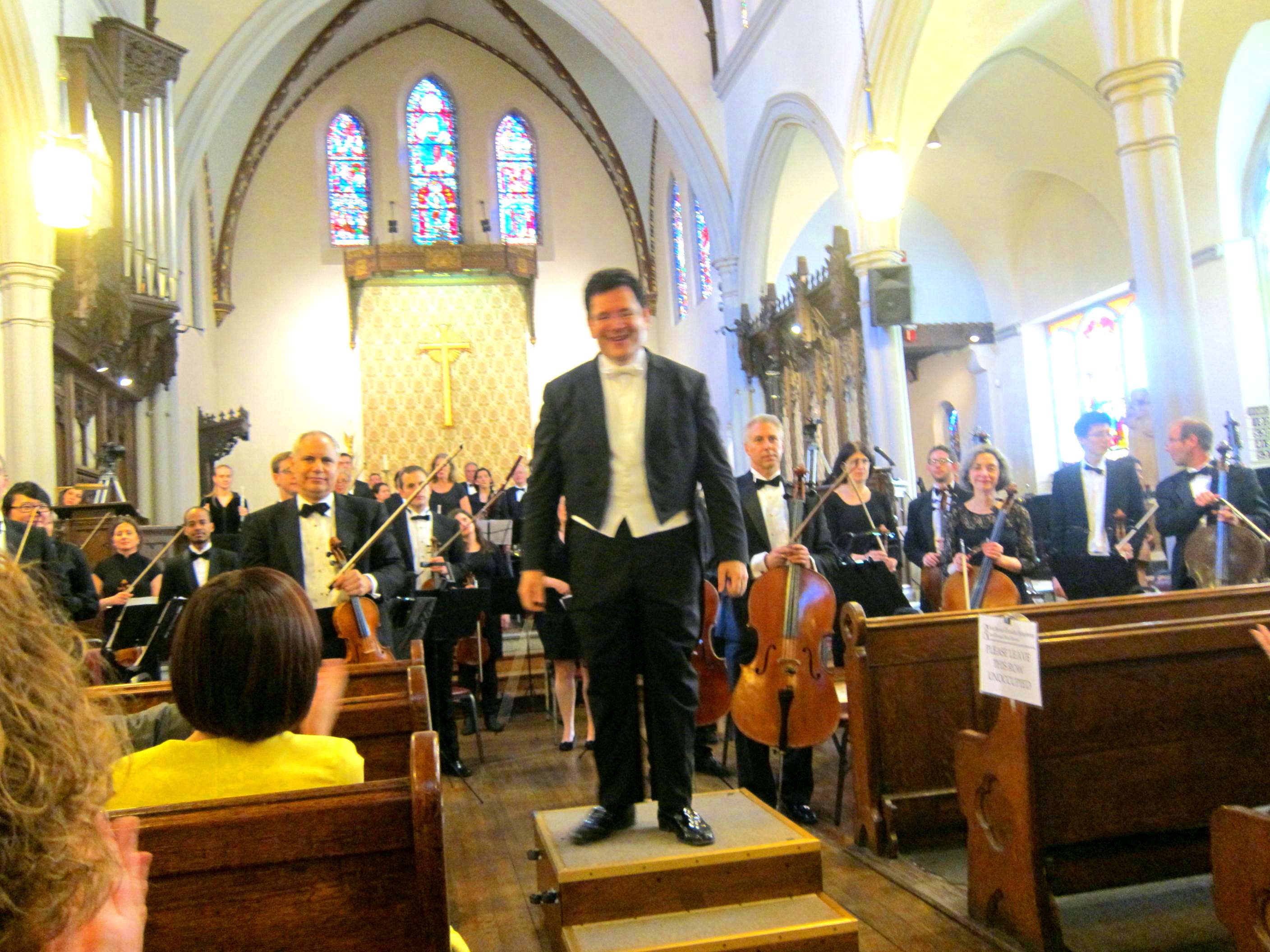|
Back
Music for an Easter Afternoon New York
All Saints Church, 230 East 60th Street
05/04/2013 - May 5, 2013*
Romantic Variations
Leo Kraft: Variations For Orchestra
Wolfgang Amadeus Mozart: Concerto for Piano No. 23 in A major, K. 488
Peter Ilych Tchaikovsky: Symphony No. 5 in E minor, Opus 64
Kariné Poghosyan (Piano)
Park Avenue Chamber Orchestra, David Bernard (Music Director/Conductor)

D. Bernard at All Saints Church (© Coco T. Dawg)
The Park Avenue Chamber Symphony, a name new to me in this city with hundreds of orchestras, is more than a gallant group of amateurs. For nearly 15 years, they have worked with sterling soloists, have performed diverse programs and even made some discoveries.
One of them came in the concert yesterday afternoon in their usual venue of the Victorian-era Episcopal church, All Saints. Composer Leo Kraft, a once renowned composer, teacher and author, isn’t played much these days, but his music is a welcome time-trip to the days of David Diamond, Roy Harris, and his own mentor Randall Thomson. This was the “American” music pioneered by Aaron Copland, music which was jaunty, melodic, optimistic and far from the European models which had shaped our concerts.
The nonagenarian composer himself was in the church to hear his Orchestral Variations, put together with art, skill and frequent good humor. Mr. Kraft did a neat parody of Béla Bartók (himself a pretty good parodist) in his own “game of twos”. His other variations ran the usual gamut from quiet variations to energy and a perfectly crafted fughetta to end.
The Park Avenue Chamber Symphony performed adequately, I imagine, since their Music Director, David Bernard, is certainly an energetic and more than competent conductor. I found the instrumental colors a bit muddy, but perhaps this was the fault of the original writing.

K. Poghosyan (©Dale Kolarek)
Piano soloist Kariné Poghosyan was a delight to hear, especially with a Mozart-sized orchestra, and some excellent wind playing. Admittedly, this Armenian-American artist didn’t actually need a piano, since I have rarely seen a soloist who registered a different emotion (sometimes two or three) with every measure she played. No judgment on whether this is good or bad, but I’d hate to be her partner in a game of poker.
On the other hand, Mozart’s so charming 23rd Concerto has such a diversity of emotions, feelings and moods in the outer movements that perhaps Ms. Poghosyan had no choice. And yes, her fingers did ripple through these sections seemingly with little effort. Wisely, her pedaling was kept to a minimum, the orchestra under Mr. Bernard did not dazzle one with undue brilliance, so Ms. Poghosyan could perform with some marvelous technical skills.
The Adagio has such a sublime tenderness that I’ve never heard a pianist really plumb the Mozart depths. But Kariné Poghosyan made a noble effort, and those ten repeated notes at the end were poignant cries.
After the intermission (where one could study ((what I consider)) those all too garish vitreaux, showing Jesus in Armani-designed robes), I had to wonder why it was necessary to hear Tchaikovsky on a sunlit Spring Manhattan afternoon. The Pantheist in me would have anathematized the programmer. So evidently, I rationalized that this was a tribute to the Eastern Orthodox Church for their Easter Sunday.
Yet one had to ask whether the 60-odd players of the Park Avenue Symphony could handle a Fifth Symphony usually played with 100 musicians? Yes and no. Outside of a few horn glitches, Mr. Bernard’s orchestra played with due aplomb, giving good pictures of those desolate clarinet solos and the Tchaikovsky fanfares. In all, the mass of players was technically excellent.
The few problems came in the lighter moments: the Valse and the softer scurrying passages for strings. One could easily spot the grout between the building blocks, those few stains–not so much technical mistakes as forced hard playing– rather than ballet-master Tchaikovsky’s saving gracefulness.
But with Tchaikovsky, one can sit back and enjoy his despairs and delights, and the Park Avenue Symphony allowed pure enjoyment to overcome a few grouchy objections.
Harry Rolnick
|